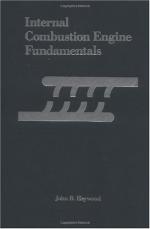|
This section contains 1,232 words (approx. 5 pages at 300 words per page) |

|
Combustion is the chemical term for a process known more commonly as burning. It is certainly one of the earliest chemical changes noted by humans, at least partly because of the dramatic effects it has on materials. Today, the mechanism by which combustion takes place is well understood and is more correctly defined as a form of oxidation that occurs so rapidly that noticeable heat and light are produced.
Probably the earliest reasonably scientific attempt to explain combustion was that of Johannes (or Jan) Baptista van Helmont (1580-1644), a Flemish physician and alchemist. Van Helmont observed the relationship among a burning material, smoke, and flame and said that combustion involved the escape of a spiritus silvestre (wild spirit) from the burning material. This explanation was later incorporated into a theory of combustion--the phlogiston theory--that dominated alchemical thinking for the better part of two centuries.
According to the phlogiston...
|
This section contains 1,232 words (approx. 5 pages at 300 words per page) |

|


